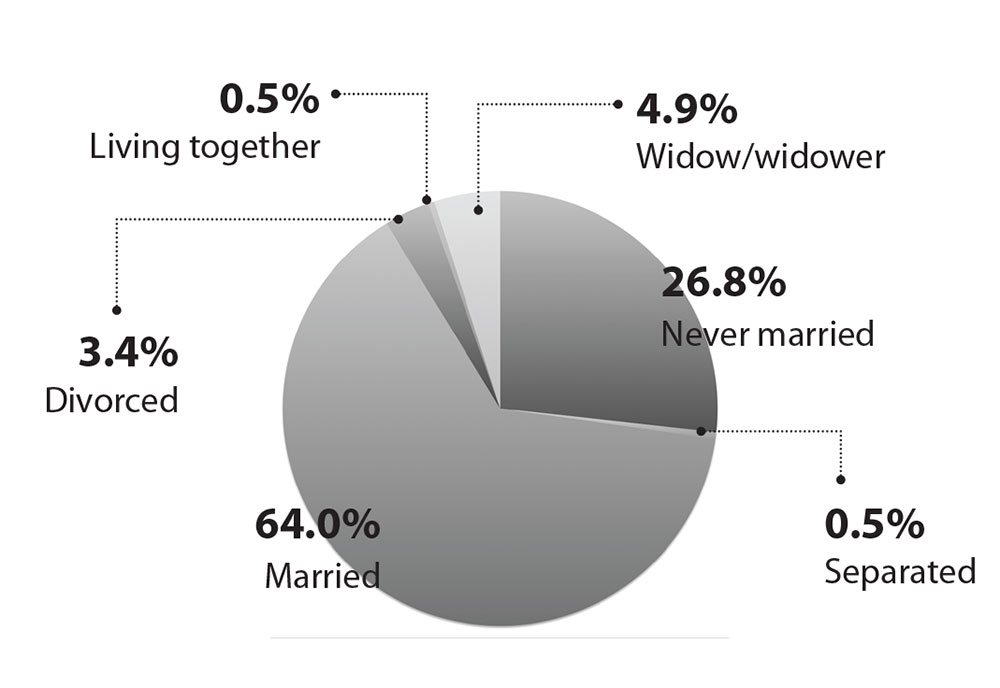… more divorced women than men were single at the time of the survey
Lhakpa Quendren
For more than four years, Tshering Lhaden, 32, in Thimphu had been into marital trouble after she discovered her husband’s illicit extramarital affair with another woman.
In September 2017, the mother of two finally decided to divorce her husband. He readily agreed to end their marriage, and a few days later he married the other woman.
Her story is one of many contributing to the increasing number of divorces in the country.
According to National Statistics Bureau’s (NSB) Bhutan Living Standard Survey 2022, divorce cases increased from 2.1 percent in 2017 to 3.4 percent in 2022.
This means of the 486,449 population 15 years and above, 16,399 were reported as divorcees at the time of the survey last year, an increase of 2,110 divorcees, compared to 14,289 in 2017.
The report reveals that the number of divorced females (11,917) is higher than males (4,481) with most cases happening among illiterate people and those with primary education.

Divorce reasons
Kuensel contacted Supreme Court, Centre for Bhutan and GNH Studies, including NSB, and anthropologists. However, none of them has data and detailed studies on such issues.
The President of Norbuling Rigter College in Paro, Tandin Dorji (PhD), an educationist and a researcher, said that divorce could be increasing due to change in lifestyle and family patterns.
“In the past, it was a joint family. Now it is becoming a more of nuclear family where both parents are working. So they have got a combination of family and professional work stress,” he said, adding it could be because of the inability of the younger generation to adopt and cope with this kind of situation.
According to the National Commission for Women and Children (NCWC), alcohol, socio-economic development and lifestyle, extramarital affairs, intimate partner violence, and access to technology are the probable causes of divorces.
Research published in 2013 on divorce in Bhutan by Nitasha Kaul (PhD), a London-based academic, stated that divorce in Bhutan was traditionally very common, inexpensive, easy to get, and not associated with any stigma.
She said that the attitude to sex is generally casual and non-prescriptive. “A formalisation of marriage in urban areas is also resulting in a formalisation of separation in the form of divorce.”
“Infidelity, promiscuity, extramarital affairs, domestic violence, alcoholism, parental interference, gambling, and a mismatch of expectations are all blamed for this by the news media commentators,” she stated.
According to NSB’s monograph – Sexual and Reproductive Health of Adolescents and Youth in Bhutan 2015, modern marriage, based on new ideas of love and romance, on the other hand, is leading to frequent divorce cases.
“Divorce has become more common. Customs and laws that enforced the subordination of wives to husbands are giving ways to gender equality to sexuality,” it stated.
Challenges and way forward
A lack of official statistics and in-depth studies on the prevalence and causes of divorce remains inadequate for prediction and decision-making.
NCWC officiating Director General Ugyen Tshomo said that there is a need for prevalence and related studies to understand the situation and cause of divorce based on which appropriate measures would be developed. “While also continuing advocacy and awareness programmes on consequences of divorces, particularly on the children.”
However, the lack of social impact analysis of economic development activities and their consequences on communities and implementing appropriate risk mitigation measures remains a challenge.
Lack of evidence on the extent, causes, and risk factors, lack of family and couple counseling services, limited awareness on the impact of divorce especially on children, and unintended marriage and pregnancy at a young age, among others, are challenging to address this issue.
NCWC provides legal and other support to survivors of intimate partner violence who are seeking a divorce and divorced women who are in difficult circumstances.


